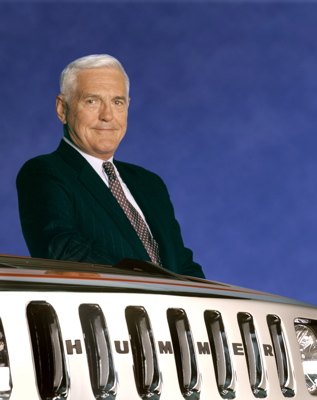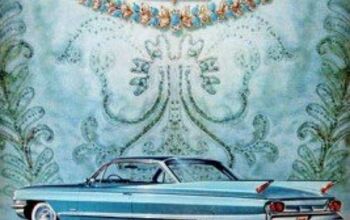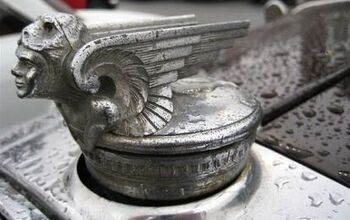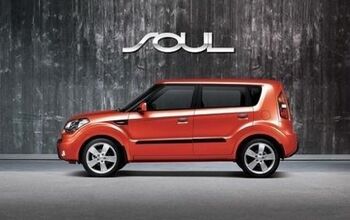Editorial: General Motors Death Watch 256: Clutch Players
The mainstream media tends to fumble the metaphorical football on the symbolic goal line. With fewer than twenty-four hours left before General Motors files for Chapter 11, the MSM is set to go back, Jack, and do it again. Instead of excoriating GM’s management for not taking in more money than they spent, they’re parsing the American automaker’s bankruptcy as a “sign of the times.” Leading this electronic charge of the heat without light brigade: P. J. O’Rourke. Writing for the Wall Street Journal, O’Rourke paints GM’s dissolution as confirmation that America’s love affair with the automobile is, finally, dead. Rubbish.
Quick digression: Yesterday, I was looking for something to healthy to eat at Six Flags New England. As you might imagine, I’d have had better luck trying to win an enormous Tweety Bird by tossing small plastic rings at the necks of custom-made, ring-aversive milk jugs. As I consumed a greasy hot dog on a butter infused bun, I thought, well, that’s the way it is.
If these teeming throngs wanted a healthy salad or a chilled fruit cup, Six Flags would sell them. The vast majority of their coaster-lovin’ customers want fried foods and sugary drinks. Six Flags has a business to run. So they give their customers what they want. Tough luck for me. The same inescapable economic logic applies to the manufacturers of P. J. O’Rourke’s diss-missed automotive “appliances.”
Contrary to the prosaic pistonhead’s rant, no one forced Americans out of their charismatic, high horsepower barges into boring and bland vehicles. Truth be told, the average consumer wanted personal transportation that they didn’t have to think about it. The automakers who best provided these vehicles thrived. The ones who could not do so, both consistently and profitably, did not.
It’s one of those ipso facto deals. If American car buyers didn’t place reliability above all, they’d still be driving union-built be-finned rust buckets that required constant mechanical attention. The fact that Toyota, Honda, Nissan and Hyundai are solvent, while GM is not, is a simple reflection of the transplanted automakers’ ability to give the people what they want.
Never mind the bailout or O’Rourke’s pining for more “adventurous” times. The free market has spoken. GM must die.
Was this desire for aesthetically neutral four-wheeled appliances nurture (roadside stranding, lousy dealer service, inconvenience and expense) or nature (if I wanted to be a mechanic I’d be one)?
O’Rourke blames suburban ennui (i.e., car as cupholder) and “busybodies of the environmentalist, new urbanist, utopian communitarian ilk.” He bemoans the end of the legacy of the swaggering, charisma-loving “romantic fools” who created America’s automotive giants. Yes, well, it was these self-same car guys that condemned GM to its ultimate fate as a tax-sucking zombie.
Former GM CFO and ex-CEO Rick Wagoner is [rightly] blamed for pissing away billions on ill-advised acquisitions. He merits condemnation for refusing to man-up and declare bankruptcy when the company could have done so under its own steam. And he deserves his place in infamy for handing the keys to the executive washroom to the federal government. Still, ultimately, the beancounters didn’t kill GM. The car guys did.
The car guys failed to commit the company to designing and building the small range of bland, reliable, competitive, cost-effective automotive products it needed to survive. They were drunk on pickups. High (and mighty) on SUVs. When it came to more pedestrian metal, GM’s senior (i.e., divisional) car guys threw whatever they had against the wall to see what would stick. Not much did, and they didn’t care.
Don’t tell me that Wagoner and his predecessors tied the car guys’ hands behind their backs, forcing them to accept badge-engineered mediocrity. They were happy enough to go along for the ride. And why not? They were hugely compensated cogs in a corporate culture where failure was impossible, gorging on unimaginable riches simply for keeping the status quo. Speaking of which . . .
It should never be forgotten that Car Czar Bob Lutz squandered GM’s last remaining chance at a genuine, product-led turnaround. Lutz doubled-down on a half-assed redesign of GM’s trucks, imported sales stinkers and commissioned poorly-developed niche-mobiles without a hope in hell of mass success. Lutz’ highly-touted Chevrolet Malibu was a singular vehicle; it was also too little too late.
Here’s the funny, horrible thing: you can hear echoes of Bob Lutz in O’Rourke’s paradise lost essay. Like Lutz, O’Rourke believes that American car culture is practically dead. Both men mistake the end of a certain kind of enthusiasm—their own—for a wider malaise. They don’t understand that automotive enthusiasts will always be a relatively insignificant minority of the American public; tens of millions of motorists want cheap, reliable, comfortable, practical, safe, not-too-thirsty, not-ugly transportation.
No one’s asking P. J. O’Rourke to respect appliance drivers. But GM’s inability to do so was, in the final analysis, the death of them.
More by Robert Farago
Latest Car Reviews
Read moreLatest Product Reviews
Read moreRecent Comments
- Lorenzo This car would have sold better if there was a kit to put fiberglass toast slices on the roof.
- Lorenzo The Malibu is close to what the 1955 Bel Air was, but 6 inches shorter in height, and 3 inches shorter in wheelbase, the former making it much more difficult to get into or out of. Grandma has to sit in front (groan) and she'll still have trouble getting in and out.The '55s had long options lists, but didn't include a 91 cubic inch four with a turbo, or a continuously variable transmission. Metal and decent fabric were replaced by cheap plastic too. The 1955 price was $1765 base, or $20,600 adjusted for inflation, but could be optioned up to $3,000 +/-, or $36,000, so in the same ballpark.The fuel economy, handling, and reliability are improved, but that's about it. Other than the fact that it means one fewer sedan available, there's no reason to be sorry it's being discontinued. Put the 1955 body on it and it'll sell like hotcakes, though.
- Calrson Fan We are already seeing multiple manufacturers steering away from EVs to Hybrids & PHEVs. Suspect the market will follow. Battery tech isn't anywhere close to where it needs to be for EV's to replace ICE's. Neither is the electrical grid or charging infrastructure. PHEV's still have the drawback that if you can't charge at home your not a potential customer. I've heard stories of people with Volts that never charge them but that's a unique kind of stupidity. If you can't or don't want to charge your PHEV then just get a hybrid.
- AZFelix The last time I missed the Malibu was when one swerved into my lane and I had to brake hard to avoid a collision. 1 out of 5⭐️. Do not recommend.
- 2ACL I won't miss it; it was decent at launch, but in addition to the bad packaging, GM did little to keep it relevant in the segment. I'd prefer that another domestic automaker doesn't just give up on the mainstream sedan, but unlike some of Ford's swan songs, the Malibu made an indifferent case for why they should live.

































Comments
Join the conversation
You used "Going-out-of-business-until-Renault-saved-our-asses" Nissan as a case of solvency? HA! Ok, so let me get this straight? It wasn't Red Ink Rick or other finance guys who ruined the car industry but the car guys who didn't do a good enough job standing up to their bosses? Heh, that's as absurd a concept as a truly free market (which doesn't exist but in economic fantasy land) that can actually dictate if GM dies or not. Besides, GMs real death knell is hideous debt and legacy costs. They still have shit loads of revenue coming in (even today after the bankruptcy/bail out drama) so that if they could get the cost part of revenue-cost=profit low enough they can make cash even selling one solitary car.